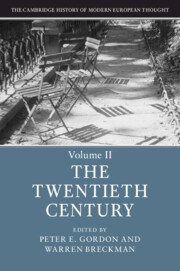Book contents
- The Cambridge History of Modern European Thought
- The Cambridge History of Modern European Thought
- The Cambridge History of Modern European Thought
- Copyright page
- Contents
- Contributors
- Preface
- Introduction
- 1 Sociology and the Heroism of Modern Life
- 2 Psychoanalysis: Freud and Beyond
- 3 Modern Physics: From Crisis to Crisis
- 4 Varieties of Phenomenology
- 5 Existentialism and the Meanings of Transcendence
- 6 Philosophies of Life
- 7 The Many Faces of Analytic Philosophy
- 8 American Ideas in the European Imagination
- 9 Revolution from the Right: Against Equality
- 10 Western Marxism: Revolutions in Theory
- 11 Anti-imperialism and Interregnum
- 12 Late Modern Feminist Subversions: Sex, Subjectivity, and Embodiment
- 13 Modernist Theologies: The Many Paths between God and World
- 14 Modern Economic Thought and the “Good Society”
- 15 Conservatism and Its Discontents
- 16 Modernity and the Specter of Totalitarianism
- 17 Decolonization Terminable and Interminable
- 18 Structuralism and the Return of the Symbolic
- 19 Post-structuralism: From Deconstruction to the Genealogy of Power
- 20 Contesting the Public Sphere: Within and against Critical Theory
- 21 Restructuring Democracy and the Idea of Europe
- Index
19 - Post-structuralism: From Deconstruction to the Genealogy of Power
Published online by Cambridge University Press: 19 August 2019
- The Cambridge History of Modern European Thought
- The Cambridge History of Modern European Thought
- The Cambridge History of Modern European Thought
- Copyright page
- Contents
- Contributors
- Preface
- Introduction
- 1 Sociology and the Heroism of Modern Life
- 2 Psychoanalysis: Freud and Beyond
- 3 Modern Physics: From Crisis to Crisis
- 4 Varieties of Phenomenology
- 5 Existentialism and the Meanings of Transcendence
- 6 Philosophies of Life
- 7 The Many Faces of Analytic Philosophy
- 8 American Ideas in the European Imagination
- 9 Revolution from the Right: Against Equality
- 10 Western Marxism: Revolutions in Theory
- 11 Anti-imperialism and Interregnum
- 12 Late Modern Feminist Subversions: Sex, Subjectivity, and Embodiment
- 13 Modernist Theologies: The Many Paths between God and World
- 14 Modern Economic Thought and the “Good Society”
- 15 Conservatism and Its Discontents
- 16 Modernity and the Specter of Totalitarianism
- 17 Decolonization Terminable and Interminable
- 18 Structuralism and the Return of the Symbolic
- 19 Post-structuralism: From Deconstruction to the Genealogy of Power
- 20 Contesting the Public Sphere: Within and against Critical Theory
- 21 Restructuring Democracy and the Idea of Europe
- Index
Summary
Summarizing post-structuralism faces an initial challenge since as a style and a form of thought it submits to self-reflexive criticism the identity, clarity, and fixedness of delineation itself. By definition it problematizes definition in ways that take issue with the task of concise historical appraisal. Still, we can distinguish two generative scenes: French thought in the 1960s and 1970s, and its global reception. Reflecting complex similarities to and differences from structuralism, post-structuralist styles of thought came to be associated with diverse figures such as Louis Althusser, Roland Barthes, Jean Baudrillard, Hélène Cixous, Guy Debord, Gilles Deleuze, Jacques Derrida, Michel Foucault, Félix Guattari, Luce Irigaray, Julia Kristeva, Jacques Lacan, and Jean-François Lyotard. The term post-structuralism, however, never resonated a great deal in France itself.
- Type
- Chapter
- Information
- The Cambridge History of Modern European Thought , pp. 490 - 516Publisher: Cambridge University PressPrint publication year: 2019
- 1
- Cited by

